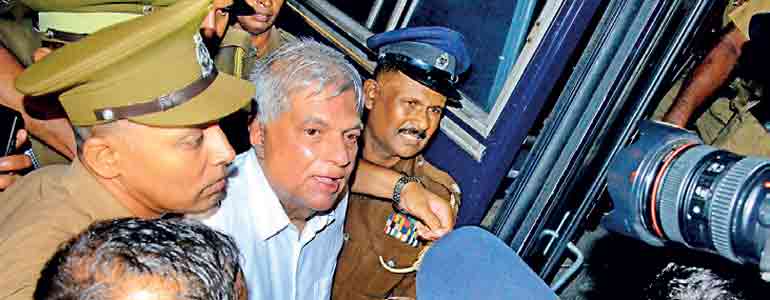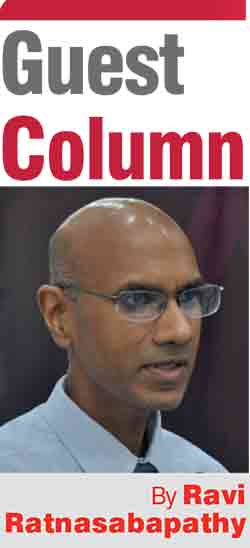Sunday Feb 15, 2026
Sunday Feb 15, 2026
Friday, 29 August 2025 03:58 - - {{hitsCtrl.values.hits}}

Former President Ranil Wickremesinghe outside the Magistrate’s Court on 22 August 2025 – File photo
The arrest of former President Ranil Wickremesinghe has provoked much debate between his supporters who see it as a case of political victimisation and others who see it as a case of the law now being applied to people who were previously above the law.
M.A. Sumanthiran, a lawyer, has said that while heads of state must indeed be held accountable and prosecuted, the arrest of former President Ranil Wickremesinghe on a Friday, coupled with the decision to oppose bail, appeared ill-advised1. Other commentators have said that they could have charged him  under s. 111 of the Anti-Corruption Act. Instead he was charged under Sections 386 and 388 of the Penal Code and Section 5(1) of the Public Property Act, the significance of which is that bail is available only in exceptional circumstances. He was produced before the Court at 3 p.m. on Friday, leaving little time for legal deliberations and the Magistrate placed him in remand custody at 10 p.m.
under s. 111 of the Anti-Corruption Act. Instead he was charged under Sections 386 and 388 of the Penal Code and Section 5(1) of the Public Property Act, the significance of which is that bail is available only in exceptional circumstances. He was produced before the Court at 3 p.m. on Friday, leaving little time for legal deliberations and the Magistrate placed him in remand custody at 10 p.m.
These developments raise important questions about due process. In particular they highlight the critical need for prosecutorial independence. A strong rule of law and the effective implementation of national anti-corruption legislation require prosecutors to act free from any undue external pressure.
In Sri Lanka however, the Attorney General (AG) occupies a dual role: both as chief prosecutor and the Government’s legal advisor. The AG has wide discretion in initiating, maintaining and withdrawing prosecutions. This dual mandate creates an inherent conflict of interest, especially when state actors are implicated. The International Commission of Jurists has noted “a lack of will to prosecute State actors in human rights cases, particularly those relating to the conflict.” Moreover, the practice of appointing judges from within the AG’s Department risks entrenching judicial loyalty to the executive2.
Public prosecution must be non-partisan and insulated from political influence. The demand for an independent prosecutor resurfaced recently after the AG order to release three suspects linked to the murder of journalist Lasantha Wickrematunge3. The circumstances surrounding Wickremesinghe’s arrest underscore the urgency of this reform.
Public prosecution must be non-partisan and insulated from political influence. The demand for an independent prosecutor resurfaced recently after the AG order to release three suspects linked to the murder of journalist Lasantha Wickrematunge
Recommendations
1.Create an independent Director of Public Prosecution (DPP)
All prosecutions should be handled by the DPP, not the police. The police should confine themselves to investigation, while the AG should remain solely the Government’s legal adviser.
The UK’s Royal Commission on Criminal Procedure, looking at the role of the police as prosecutors, the Commission found that a police officer who carries out an investigation, inevitably, and properly, forms a view as to the guilt of the suspect. They felt, however, that without any improper motive the officer may then be inclined to shut his mind to other evidence which undermines that view or overestimates the strength of the evidence gathered. In the absence of effective oversight, there was also greater opportunity for police corruption.
2.Adopt a prosecution code of practice:
The DPP must be governed by a code of practice that sets out principles on which to prosecute. One of the most important tasks is to review the evidence in the file in order to decide whether it justifies the charge laid by the police, applying criteria set out in the code of practice. They must determine if evidence is sufficient, reliable, credible and if prosecution is in the public interest.
3.End judicial recruitment from the AG/DPP:
The practice of drawing the judiciary from the ranks of the AG or the DPP should cease.
Delivering justice: controlling the police
Rights are granted by laws but their enforcement depends on the system of justice. It must protect the rights of citizens against infringement by others, including the government and the powerful.
The police maintain the law, protecting people and their property, preventing crime. Courts provide redress for wrongs. The Attorney General prosecutes crime.
A strong rule of law and the effective implementation of national anti-corruption legislation require prosecutors to act free from any undue external pressure. In Sri Lanka however, the Attorney General (AG) occupies a dual role: both as chief prosecutor and the Government’s legal advisor. The AG has wide discretion in initiating, maintaining and withdrawing prosecutions. This dual mandate creates an inherent conflict of interest, especially when state actors are implicated
Police
To provide security and maintain the rule of law the police are given special powers: to arrest and detain and the power to use force. This monopoly on the use of force places the police in a unique and sensitive position within the democratic State. Adequate control mechanisms are required to ensure that these powers are consistently used in the public interest. Risk of misuse include: police brutality, deaths in custody, torture and ill-treatment, extrajudicial killings, enforced disappearances and excessive use of force, including in cases of demonstrations.
Controls should include:
1.Laws specifying functions and powers of the police (in line with international human rights laws).
2.Operational procedures/instructions that reflect the spirit and letter of the law.
3.Complaints mechanisms, both to police leadership and external bodies.
4.Procedures on dealing with misconduct, disciplinary and criminal, overseen by an independent body.
5.Proper training, basic and on-going.
For example, the UK police are subject to the Police and Criminal Evidence Act 1984, which set the powers of police on matters of stop and search; entry, search and seizure; arrest, detention and the questioning of suspects. Failure to follow these rules can result in failures to secure convictions because the courts render inadmissible any evidence which has not been fairly obtained. Codes of Practice created under the Act govern cautioning procedures, identification parades and a range of other responsibilities. Breach of the codes is admissible in evidence in criminal or civil proceedings against the police.
Separately the UK has a Human Rights Act, requiring all public bodies to respect human rights. They may be taken to court for failure.
Recommendations
Sri Lanka’s police ordinance of 1865 needs to be replaced by something on the UK lines along with standard codes of practice.
1.Sri Lanka needs proper legal protection for human rights. Currently human rights have weak protection under the (circumscribed) fundamental rights chapter, the ICCPR Act, No. 56 of 2007 and the Human Rights Commission.
2.Article 15 of the constitution restricts fundamental rights for a variety of reasons including parliamentary privilege, contempt of court, defamation. Article 16 allows any pre-existing laws to prevail notwithstanding inconsistency with fundamental rights, effectively limiting its application.
3.The Sri Lankan ICCPR Act makes a mockery of the International Convention on Civil and Political Rights. It contains only four main substantive rights-conferring provisions (compared to the 20+ in the international act) and these too in abridged form.
4.“The Sri Lankan bill of rights is incomplete and structurally incoherent.” (Welikala & Edrisinha).
Therefore, repeal articles 15 and 16 of the constitution, amend the ICCPR act in line with international practice and consider a new human rights act.
Footnotes:
1https://lankanewsweb.net/archives/119498/sumanthiran-arrest-of-ranil-ill-advised/
2International Commission of Jurists. 2012. Authority without accountability: The crisis of impunity in Sri Lanka. [ONLINE] Available at: http://www.refworld.org/pdfid/50ae365b2.pdf. [Accessed 15 October 2018]
3https://www.ifj.org/media-centre/news/detail/category/press-releases/article/sri-lanka-no-justice-for-lasantha-wickrematunge-as-murder-suspects-released#:~:text=In%20a%20letter%20to%20the,the%20Mount%20Lavinia%20Magistrate’s%20Court.